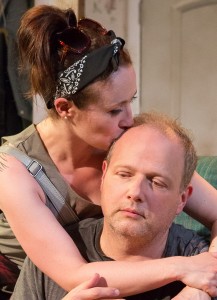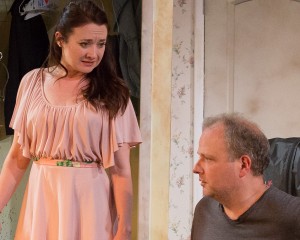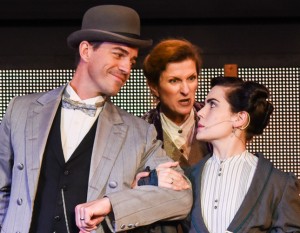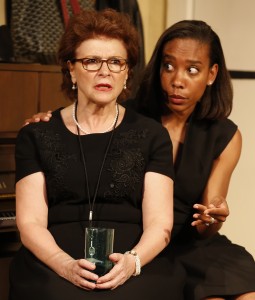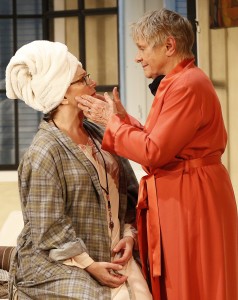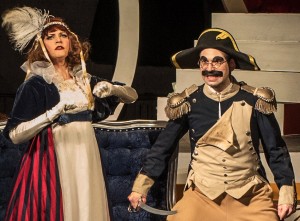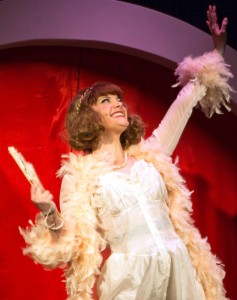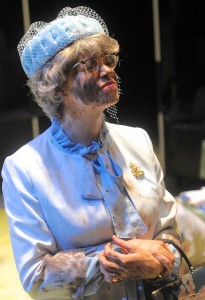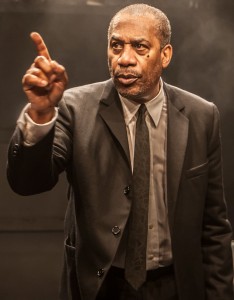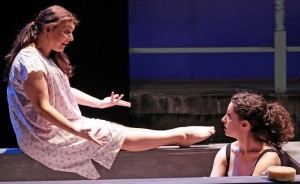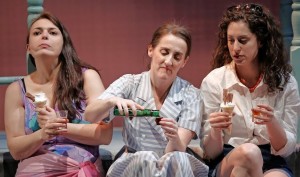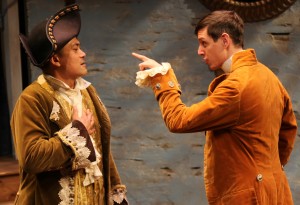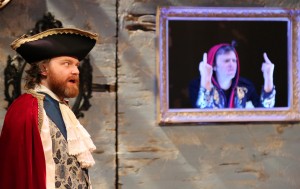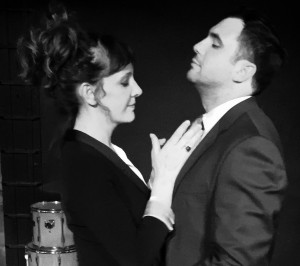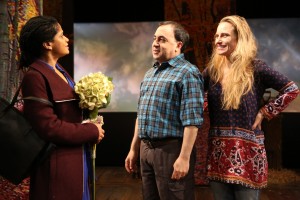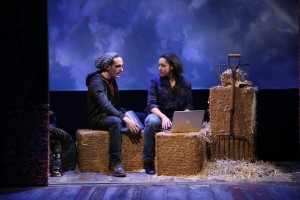A classic case of mistaken identity sets a hilarious ball in motion in The Government Inspector, Nikolai Gogol’s 1836 comedy, set in a small town, a backwater of “mud and more mud.” The plot follows the mayor (the robust Michael McGrath) who has heard that a government inspector is coming to town—incognito. The mayor and his crooked cronies—the school principal (David Manis), the judge (Tom Alan Robbins) and the hospital director (Stephen DeRosa)—immediately try to clean up the mess they have made of government buildings and services.
Hamlet. A Version
Boris Akunin’s Hamlet. A Version reimagines Shakespeare’s classic tale of political intrigue as a multi-layered murder mystery. Akunin, a Russian writer best known for his Sherlock Holmes–like character Fandorin, which has a cult following, does not write just for thrills. His Hamlet is a tragedy but also a whodunit.
Luft Gangster
Lowell Byers’s play Luft Gangster was inspired by the real-life story of Louis Fowler, a waist gunner during World War II. The play opens on a tender scene between Lou (played by Byers himself with a wonderful mix of stoicism and sincerity), and his mother, who is clearly sick or mentally ill. Louis’s father is long dead, and when his mother dies, he enlists to fight. His plane is shot down and he is captured and interrogated by the Nazis, but they don’t get a word out of him. At first he’s put in a makeshift holding cell where he is joined by another flier, Joe, played with a wonderful earnestness by Sean Hoagland, who doubts they’ll get out alive. Lou tells him, “I don’t think it’s my time to go.” Joe retorts: “I just hope they know that.”
Villa
Villa, written and directed by Guillermo Calderón, opens on three women who are considering a scale model of the “villa,” a place in Chile where, in the 1970s under military dictator Augusto Pinochet (who ruled from 1973–90), atrocities were carried out, predominantly against women. One of the three, who are present-day Chileans, suggests making it into a Disneyland-like theme park of terror. There are other suggestions, too, but when they try to vote, each time a “spoiled ballot” appears that implies at any given time, one of them cannot be impartial—and the vote must be unanimous.
Peer Gynt and the Norwegian Hapa Band
The Ma-Yi Theater Company’s Peer Gynt and the Norwegian Hapa Band offers a sonic interpretation of Henrik Ibsen’s saga Peer Gynt. Ibsen wrote Peer Gynt in 1867 as a dramatic poem, and it was staged a decade later with music by Norwegian composer Edvard Grieg that has become famous. The play touches upon Norwegian mythology and folk tales, and it captures the hard and difficult times of mid-19th-century life in Scandinavia.
AdA: Author Directing Author
The third edition of AdA: Author Directing Author has programmed three one-acts based on the theme of power. This year AdA founders Neil LaBute and Marco Calvani are joined by Spanish playwright Marta Buchaca, with each presenting a play directed by one of the others.
Street Children
Pia Scala-Zankel’s 2014 play Street Children captures a small slice of life for gay and transgender kids on the streets, and features an ensemble of transgender, queer and gender-fluid actors. Set in the late 1980s around the West Side piers on the outskirts of the West Village, sex is currency in their milieu. When Jamie, played skillfully by Eve Lindley, arrives for the first time at the piers, her nose has been bloodied by a trick gone bad. She’s 17 and unschooled in this world yet she has nowhere else to go. Like all the kids who arrive here, she has been rejected by her family and society at large.
Order in the House
Are all plays that are lost and recovered theatrical treasures? At first, A Day by the Sea, the Mint Theater’s production of a neglected 1953 play by British dramatist N.C. Hunter, suggests the answer is no. However, under Austin Pendleton’s steady and gentle direction, we gradually see how effectively Hunter scratches the surface of social interactions to reveal what lies beneath: sadness, anger, and disappointments, as well as hopes and dreams. As the play opens, Julian Anson (Julian Elfer), a civil servant living in Paris, has come for a visit to see his mother at the family’s seaside estate. He doesn’t really want to stay. He barely sits down, and when offered a lawn chair, appears extremely uncomfortable in Elfer’s fine characterization. He captures Julian’s physical and social awkwardness. His stooped posture and pinched face communicate frustration, and his body seems to lean toward the exit, like he’s yearning to make a quick escape.
Julian’s mother, Elinor Anson (Jill Tanner), has been keeping up the estate, but she is particularly frustrated by Julian’s lack of interest in the villa, and also by her aging uncle, David Anson (George Morfogen), who seems about to expire. Morfogen brings the right combination of lethargy and energy to the role, showing both a doddering elder and someone who’s not quite ready to give up on life. Elinor frets over the household expenses, part of which go to alcohol consumed by David’s live-in caretaker, Doctor Farley (Philip Goodwin), who often launches into dark, despairing tangents. Julian’s response is “the drinking isn’t dangerous, just boring.” Additionally, there is the estate’s accountant, William Gregson (Curzon Dobell), who also seems to be in limbo.
A group of visitors is also in the mix. Frances Farrar (Katie Firth), who is staying at the villa with her children while she disentangles herself from a marriage, has been away for 20 years. She was raised by Elinor, along with Julian, after she was orphaned. Though hardly scandalous today, in the period of the play divorce is talked about with a hushed air. Frances is what might be called a “hot mess.”
Another “hot mess” is the nanny, Miss Mathiesen (Polly McKie) who, at 35, has never been married, but has her eye on the doctor. The actual day of Hunter’s title occurs in the second act (of three), and it brings forth the tensions that lead to Julian’s recognition of his stiflingly rigid life. Elinor insists he join the family for the outing, which forces him to meet his boss, Humphrey Caldwell (Sean Gormley), at the beach, where Caldwell delivers unpleasant news. At first Julian’s reaction is angry and impulsive: he uncharacteristically climbs a cliff to retrieve a lost kite for one of France’s two children. Climbing the cliff, retrieving the kite, and tearing his trousers—all seem to loosen him up, and he becomes more candid and open.
A Day by the Sea initially seems like a play of manners. Hunter and his fellow playwrights (Noel Coward among them) were replaced in the 1950s by “the angry young men,” a group of writers who focused on the working class and their struggles living in postwar Britain, still reeling from the devastation of World War II. Plays like John Osborne’s Look Back in Anger and Harold Pinter’s The Birthday Party presented human nature in a cynical way and had characters who were cruel and self-serving as they scrambled to survive.
Although Hunter’s play is not raw like those of Pinter and Osborne, it’s not Disney either—not everyone lives happily ever after. Instead, it shows how much we really just march through life. Expert lighting by Xavier Pierce and the sets by Charles Morgan suggest the ease and comfort of an English seaside villa, but they don’t undermine the fact that personal revolutions are often frustrating, fraught with despair, and don't always lead to the expected outcome. In the end Julian tries to make sense of it all but finds no simple answers. He looks out at the vista and talks about possibly transforming the landscape to get a better view of the sea. His mother, who has done nothing but goad and chastise him for not being more successful as a civil servant, is clearly happy that he might stick around a little longer. And why not? What more perfect setting to contemplate life?
The Mint Theater production of A Day by the Sea runs through Oct. 23 at the Beckett Theater (410 West 42nd St. between Ninth and Dyer avenues). Evening performances are at 7:30 p.m. Tuesday through Saturday; matinees are at 2:30 p.m. Saturday and Sunday, with a special matinee on Wednesday, Sept. 21. Tickets are $57 and may be purchased online at Telecharge.com, by phone at 212-239-6200 or in person at the Theatre Row box office. For more information, visit minttheater.org.
(Un)Happy Family
Tolstoy said: “Happy families are all alike; every unhappy family is unhappy in its own way.” The origins of unhappiness are certainly a unique combination for every family. For the one in Ann Adams’s Strange Country, directed by Jay Stull at the Access Theater, mental illness, lack of loyalty, and addiction are the sources that lead to complications between siblings.
The play opens on a one-room efficiency apartment: beer cans, leftover foods and trash are strewn everywhere. The occupant, Darryl (Sidney Williams), is fast asleep on the couch, until his sister, Tiffany (Vanessa Vache), lets herself in. After she puts food in the refrigerator, she assesses the situation and wakes him up by spraying him with Fabreze. Roused from his sleep, Darryl cries: “That shit will give you cancer!” The irony of the line is not lost on Tiffany. Darryl is a slob who seems completely unconcerned with his personal hygiene, the cleanliness of his apartment, or his health. He even confesses that he medicates himself on a steady stream of beer and meds.
Tiffany gently tosses back an ironic barb of her own: “Maybe you’ll eat your dinner one day, rather than drink it.” As Tiffany bangs around the apartment trying to clean up, she orders her brother to go wash up so they can go to their mother’s re-commitment ceremony. This brings on a stalemate.
Tiffany seems abrasive and angry, but underneath her volatile outbursts and no-nonsense demeanor is a woman who really cares about her family. If she didn’t care so much, she wouldn’t spend her morning goading Darryl and trying to do what’s best for her family. This concern extends to her girlfriend, Jamie (Bethany Geraghty), who is stony-faced and avoids eye contact with Darryl. She seems highly displeased with the situation.
At one point in the play, which moves along organically even though the dialogue is a bit stultified in places, Darryl and Jamie find themselves alone in Darryl’s apartment. Darryl is thrilled to discover they are both trying to move forward while simultaneously being moored by addiction. He practically whoops: “You’re the first person who’s made me feel good about myself” and “You’re more fucked-up than me!”
While Tiffany tries hard to keep the family together, Darryl steadily consumes beer. As he opens one can after another, the sound of the initial pop of the tab, and then the fizz of the beer become a soundtrack for his character. Nonetheless, Darryl is like the idiot savant, or the fool in Shakespeare’s plays. For all his slovenly drunkenness, he has wisdom and insight. He’s right on when he says plaintively to Tiffany: “The whole of your life is trying to fix people who don’t want to be fixed. But you cling to it.” He knows her life’s purpose is to stay close to her family and try to keep them together, but he can’t help and doesn’t want to.
Strange Country does a good job of capturing the sadness that is brought on when a family member is suffering from a problem that is too difficult to fix. However, it also explores the complicated idea that what may be good for one person may not be good for another. Everyone has his own way of surviving, and the measures people use may not always be the right ones. For Darryl, this is his way of surviving; it’s his “normal.” Tiffany has another “normal,” a more conventional and socially acceptable one. But she doesn’t seem happy. Although Darryl seems less productive and more destructive, he seems more content with his life and himself. It’s a philosophical conundrum.
Strange Country by Anne Adams, produced by New Light Theater Project, runs until Aug. 13 at 8 p.m. Wednesday–Saturdays at Access Theater(380 Broadway at White Street, in Tribeca). Tickets are $15 in advance, $18 at the door, and can be purchased online at: http://www.newlighttheaterproject.com.
Liberty for All
Liberty: A Monumental New Musical captures an America not unlike the one we see today: a place where people want to come, but also where many struggle to find work and build a simple but stable life. The story begins when Frédéric-Auguste Bartholdi, a French artist, lovingly completes his statue and sends her to the United States (it's a gift from France to commemorate a century of independence), as if she were his own child. Liberty (played by teenage actress Abigail Shapiro) comes looking for a pedestal on which she can stand to spread her message of hope and freedom.
However, when she arrives at Ellis Island, she is given the same treatment as every other immigrant. She is poked and prodded, and given the twice-over; only to be rejected—after all, what is her purpose here anyway? Hope? That’s not enough. Commissioner Francis A. Walker, who was responsible for the census in the mid-1800s (played with a debonair charm by Brandon Andrus), schedules her to return to France on the next boat. Liberty perseveres. After all, hope is not only for the immigrant, but for everyone seeking freedom and a better life.
The wonderful cast brings life to a variety of characters: an Italian immigrant (Nick Devito), an Irish foreman (Mark Aldrich, who also plays news mogul Joseph Pulitzer), a Russian knish seller (Tina Stafford, who moves gracefully between the Russian Olga, and a wealthy American heiress named Regina Schuyler), a former slave (C. Mingo Lingo), and a native American Indian (Ryan Duncan).
Liberty is a love song to New York—a city that embraces everyone, or at least tries to—but it’s also a history lesson. There’s a great deal of information about Emma Lazarus, played with tight-lipped determination by Emma Rosenthal, who is the most well-drawn character in the play, and the most interesting. She teaches English to Giovanni, an Italian immigrant who seems to hang around the port (is he being deported, or just a loafer?). His improved English increases his betting options: “Ten to one!” he says triumphantly and skitters off. Emma looks after him with a wry smile, clearly amused. This intrigue, however, is forbidden: Emma is from an affluent Jewish family that has been in America for four generations. Hanging around the port and new immigrants is not what a society girl is supposed to do, even if she is a poet, and Regina Schuyler, a wealthy woman who puts her money where it will give her the highest profile, makes sure Emma knows she’s being watched.
With book and lyrics by Dana Leslie Goldstein, there are some laughs along the way. Particularly funny are “The Charity Tango” sung by Liberty, Commissioner Walker and Schuyler, and “We Had It Worse” in which the Russian immigrant Olga and the Irish immigrant Patrick McKay compete to see who had it worse when they first arrived in America. However, as they crescendo in their comparisons, they also discover they agree on something when they sing: “Kids have no idea what hard work is” (…) “Soft” (…) “like a boiled cabbage,” and do a double-take in each other’s direction; they finish the song with a broad smile.
The production is fun, and kid-friendly, but very uneven. While the libretto is outstanding, the music by Jon Goldstein sounds canned; all the tracks seem to have been created on a synthesizer. The stage also feels small, not only because it is small, but because Evan Pappas's staging lacks dynamics and, at times, deflates the production. Some choreographed movement would have given the actors some breadth and depth and the production real musical-theater flair. Nonetheless, the cast clearly has their musical theater chops, and is led to a hopeful finale by Lady Liberty, who proves that perseverance pays off—a message we know is often true.
Liberty: A Monumental New Musical plays an open run at 42 West, 514 West 42nd St., between 10th and 11th avenues. Performances are Sundays at 2 and 5 p.m.; Mondays and Wednesdays at 3 and 7 p.m.; and Thursdays at noon and 3 p.m. Tickets are $72/$36 (premium/child premium); $63 (adult); $27 (children 4-12) and may be purchased by visiting LibertyTheMusical.com.
’Tis Better to Have Loved ...
Out of the Mouths of Babes, a fun new situational comedy by Israel Horovitz, explores both the light and dark sides of life. In it, four women, three older and one younger, gather on the eve of a funeral. The deceased was a man they were all either married to or lovers with. In the opening scene, Evelyn (the remarkable Estelle Parsons) and Evvie (the earthy yet fiery Judith Ivey) meet in his apartment. It is familiar to them both because they lived there at apparently separate times. However, it turns out there was some overlap, and you know what that means.
Added to the mix is the morose Janice (Angelina Fiordellisi, an actress with the commanding and stentorian voice of an old-school stage actress, and founding director of the Cherry Lane Theatre), who was not invited at first because she was thought to be dead—she has a history of suicidal tendencies. Her first attempt was out a window in the very same room where they are all meeting. She left him for the same reasons the others did: infidelity. Marie-Belle (effervescently played by Francesca Choy-Kee), the thirtysomething kooky and idealistic most recent girlfriend of the departed (who was 100 when he passed away), has invited them all here. She appears to have psychic access to the deceased man and channels his thoughts as well as appears to remain, literally, in touch with him when she breaks into fits of laughter from the tickling matches he engages in with her from beyond the grave.
Death, rarely welcome, but always inevitable, can provide a microscope for the living to look at their lives in the present. Although at first they are cynical and even antagonistic toward one another, the women develop a rapport and join together in their concern for Janice. Whenever they lose sight of her, they immediately bond and frantically ask: “Where’s Janice?” And, unfortunately, at one moment when the other women are caught up in a reminiscent reverie about the past and the man who is now gone, their worry proves valid. There is nothing funny about suicide, but a topic can be made funny by the right ratio of drama to comedy. Under Barnet Kellman’s direction, the balance is perfect.
Neil Patel’s scenic design not only captures the airy and orderly nature of a Parisian apartment but is further complemented by the warm and intimate space of the Cherry Lane Theatre where the play is running. Paintings adorn the walls in Parisian salon style (and turn out to be the works of famous actors such as Rosie O’Donnell, Billy Dee Williams, and Joel Grey, among others). The one painting, however, that is given the most attention is Untitled Peonies, a work that Evelyn recognizes as her own creation from when she lived in the apartment in the ’60s. She can’t believe he still has it hanging on the wall.
Each of the women—Evelyn, Evvie, and Janice—left the man for the same reason. His unfaithfulness drove them away, but the initial bitterness and anger over his infidelity covers up the sadness and lament for the loss of a great love. When Evvie says, “He was a collector,” she means it as a bad thing. However, Horowitz suggests that collecting things, like lovers or paintings of former lovers, is a way of celebrating life.
Marie-Belle turns out to have an odd agenda. She extends the idea that they should all live together after the funeral. She claims she is rich, and although she appears to be an interminable airhead, has made a lot of money playing the stock market on advice from a friend. Between the apartment and the money, she feels they could have a good life together. Perhaps she is onto some kind of new age, enlightened concept of co-housing. Janice jumps at the chance, rather than out the window again. Evelyn, who is 88, and Evie, who is 68, warm to the idea. It’s attractive, not only because of their age, but because, truth be told, they are lonely, and living together may be a good antidote. They certainly know the apartment, and for all the bad memories, there are lots of good ones as well. It was their home once before. Why not again?
Israel Horovitz’s Out of the Mouths of Babes is playing at the Cherry Lane Theatre, 38 Commerce St. (near Sixth Avenue South). Evening performances are at 7 p.m. Wednesday through Saturday; matinees are at 3 p.m. Wednesday, Saturday, and Sunday. For tickets, call OvationTix at 866-811-4111, go online to www.cherrylanetheatre.org, or purchase them at the Cherry Lane box office.
The Private Is Now Public
Who doesn’t feel good when a posting on Facebook gets lots of “likes”? It’s a place where, when something momentous in your life happens, like a marriage, or a death, your FB friends—all hundreds of them—can give you a virtual hug. It’s also where the theater company Five on a Match culled the dialogue to create its production of Seen/By Everyone, directed by Kristin Marting at HERE Theater. Although the production feels fragmented—it’s nonlinear in both story line and dialogue—it does resonate. Primarily, it asks the question through the production itself: what is the effect of social media on our lives? It’s not an original question, and certainly not one that can be definitely answered, but it’s one worth considering from time to time.
The creators (Matthew Cohn, Amir Darvish, Meg MacCary, Enormvs Muñoz, and Jean Taher) use Facebook as a starting point, and every word in the show is from Facebook posts. The play, however, is not a head-on commentary on social media, but rather about the weight and depth of what is shared in this milieu. The writers focused on two major themes: relationships and death, and as in real life, conversation about these topics may be scaled down to their lowest common denominator, or fragmented. Also true to life is the pattern of everyday communication in which we respond to immediacy of information, as well as the tendency to meander down many different roads. No wonder we love social media so much: it mirrors our needs and patterns of communication so perfectly.
The play begins with a death, and picks up different fragments of different stories about relationships. One character, a perky but lost-looking character named Maggie (Alesandra Nahodil), dressed in a pleated white skirt and a crocheted blouse (costumes are by Oana Botez), sits at a bar. She says, “I made up a birthday so I felt justified getting wasted today.” Then, “I’m good at being homeless. But not that good.” The Bartender, dressed in tremendously tall lace-up platform boots, like the gatekeeper to a leather bar, addresses her with platitudes: “It’s OK to be alone,” he repeats over and over. Later, he gives her a list of all the things she can do to feel better: “write a story, read a new book or magazine, take a nap.” She seems unappeased. Later we learn why. She’s restless but not for the reasons we think. It’s a part of the play that remains a mystery until the end. However, in his attempt to soothe her, the gatekeeper/bartender (as usual) turns out to be the wisest one.
In some scenes, more naturalistic acting and narrative bring characters together. They gather at the bar, or at tall, round tables in the center of the space and gossip, fight, laugh, cry and over share. At one point, Rose (Katie Brustele) and Bernice (Jen Taher) exchange superficial tidbits. Bernice aptly launches into a diatribe about the elimination diet she’s doing in which she can’t eat any “gluten anything, no corn, soy, chocolate, booze, pork/beef/shellfish, no dairy/cheese/yogurt/egg, no sugar, maple syrup, agave, or honey.” It’s funny because it’s timely. Everyone knows someone, or knows of someone, who is consciously taking something out of their diet.
Without the development of characterization and a story line, however, it’s hard to get a sense of who these characters are. When Bernice accuses Fred (RollsAndre) of being cynical, we have to take her word. In this world, we have to take the other’s word, and there is some suggestion that social media nullifies our individuality. This is particularly implied when actors don masks with mirrored tiles, and line up. The masks make them faceless, and take away their individually, perhaps representative of the virtual FB community that is based on photos, disembodied words, and still images, rather than real interactive ones.
The experience of watching Seen/By Everyone can be disorienting if you’re not willing to leave your typical theatergoing road map of expectations behind. In the end, it offers a thought-provoking experience about the nature of what happens when important events, or everyday issues, are filtered through the lens of sharing vis-à-vis Facebook, a place where our identities are easily socially constructed, and where information, when isolated, can be disembodied.
Five on a Match’s world premiere of Seen/By Everyone runs through June 25 at HERE (145 6th Ave.; entrance on Dominick Street). Performances are at 8:30 p.m. June 16-19 and 22-25. Tickets are $25 and may be purchased online at http://www.seenbyeveryone.com/tickets/.
Jesters of the Jazz Age
The Marx Brothers—four actual brothers, best known for their timely political commentary, sophisticated puns and physicalized comedy—left no stone unturned. They poked fun at everyone and everything: aristocrats, hobos, history, and especially relationships between men and women. I’ll Say She Is, now at the Connelly Theater, written by Will B. Johnstone, went to Broadway in 1924 and put the Marx Brothers on the map. Their rise was mercurial, and they made many movies that spread their popularity even wider.
But I’ll Say She Is, unlike their other stage shows, never became a film. It centers on a rich heiress named Beauty, played by the lovely Melody Jane, whose problem—“Society Woman Craves Excitement”—headlines the newspapers. The Marx Brothers, actors looking for work, are sent by their casting agent to woo her, and presumably get money from her. After all, her problem seems to be of great local concern. Fabulously rich, she lives with her also very wealthy aunt, Ruby, played by Kathy Biehl, who lends the role the right amount of stentorian authority. When the Brothers arrive at Ruby and Beauty’s door, the butler, played comically by C.L. Weatherstone, asks: “Gentlemen, did you come by appointment?” to which Chico responds, “No, we came by subway.”
The literal use of language is what made the Marx Brothers so brilliant. When Chico asks Harpo to cut the cards, he takes out an ax and chops them up. However, their comedy doesn’t completely rely on fast-paced antics. Instead, there are many quieter, more theatrical moments, as well as moments that showcase the array of talent the Marx Brothers had. Harpo was a gifted harpist, and Chico learned to play the piano with a special one-handed technique, and the actors successfully capture these talents.
When actors play famous personae, we want to see exactness, but what we really should be looking for is likeness. The four actors who play the Marx Brothers do a fantastic job of capturing the broader aspects of each of the brothers’ personas. And personas they were. Matt Roper captures Chico’s tight-lipped, one-sided grin, casts the sideways glances that made Chico seem both wary and earnest. Seth Shelden plays Harpo’s muteness with energy. Harpo was a pickpocket of sorts, and to recreate this theatrically takes a certain kind of magician’s ability. In one scene, Ruby suspects that he has stolen some cutlery, but she then backs off her claim. At the same time, several forks, spoons and knives fall out of Harpo’s sleeve. Shelden masters the great physical control needed to play Harpo’s mute but mischievous character.
Groucho was surprisingly successful in romance. The older women adored him for his quasi-romantic nature, and sharp humor. During a scene while courting Ruby, she calls, “Ah! My dear! At last I’ve found you.”
Groucho: “Yes, my darling, here I am.”
Ruby: “I was referring to my niece.”
Groucho: “Well, I’ll have you on your niece in no time.”
However, his exaggerated black eyebrows, painted thickly above his own, the long waistcoat, and cigar dangling from the side of his mouth make him also the most comical-looking. Noah Diamond does a wonderful job of getting Groucho’s famous walk just right with the back bent forward, and knees in a deep plié that often made Groucho look like he was gliding across the room.
And last but not least, Matt Walters plays Zeppo with all the leading-man charm reminiscent of those classic film stars Cary Grant and Clark Gable. Beauty falls in love with him at the end of the play and realizes that “there is no greater thrill than the thrill of love.”
Diamond lovingly restored the lost script by working with Johnstone’s rehearsal notes to adapt the play to the Connelly Theater, a historic venue dating back to the mid-1800s. Director Amanda Sisk, choreographer Shea Sullivan, and musical director Sabrina Chap do a marvelous job of capturing the voluptuousness of a Broadway revue during the age of vaudeville. The play, produced by Trav S.D., includes an array of 10 chorus dancers who are a triple threat: they dance, sing, and act. And of course, they all tap-dance. In their sparkly art deco dresses they bring an additional vibrancy to the stage that makes the play all the more fun in its reminiscence of a vaudeville spectacle.
I’ll Say She Is runs through July 3 at the Connelly Theater (220 E. 4th St., between Avenues A and B). Evening performances are at 8 p.m. Thursdays through Saturdays and at 7 p.m. on Sunday; matinees are at 2 p.m. Sundays. Tickets are $35 ($25 for students and seniors), available at 212-352-3101 or www.illsaysheis.com.
Truths Be Told
The British have a way of turning the everyday inside out in a humorous way. Confusions, written and directed by Alan Ayckbourn, and part of the Brits Off Broadway festival, is a masterly series of vignettes in which characters try hard to maintain normalcy and decorum, but when a single truth is revealed through an ill-timed but dramatically funny mishap, a more personal and meaningful internal world is uncovered. The cast of five—Elizabeth Hoag, Charlotte Harwood, Stephen Billington, Richard Stacey and Russell Dixon—skillfully play a handful of characters.
In “Mother Figure,” Lucy (Elizabeth Hoag) is a harried and all-consumed mother who doesn’t pay much attention to the ring of the phone, the doorbell, and thus the outside world. When her neighbors, Terry (Stephen Billington) and Rosemary (Charlotte Harwood), stop by to check on her for her husband who is away, she can’t seem to carry on a simple conversation. Instead, she offers juice to Rosemary and milk to Terry, to which he defiantly claims he “hates the damned stuff.” She counters: “I’m not going to waste my breath arguing with you, Terry. It’s entirely up to you if you don’t want to be big and strong.” Terry doesn’t have a clue how to respond. When Terry drinks all of Rosemary’s juice and then insults her, the moment uncovers some bigger marital problems. Lucy, undaunted, doesn’t believe anything can’t be solved with simple directives, and orders Terry to say he’s sorry to Rosemary. Reduced by her stern mother figure, they kiss her good-night before they leave, and when she tells them to hold hands while crossing the street, they oblige, and one feels all has been restored.
“Drinking Companion” shows Lucy’s husband, Harry (Richard Stacey), a traveling salesman who feels his wife is happier when he’s away. Desperate to connect with another adult, particularly a woman, he makes a show of being friendly with Paula (Charlotte Harwood) at the hotel bar. He struggles to pump himself up when he talks about his line of haute couture and colors, but all he really wants is companionship. As he grows drunker he tries not to make advances, but puts his key on the table, and says, “I’m going to leave it there. I’m not going to try and embarrass you, you see, but its there. If you want to pick it up, it’s there. Entirely up to you.” When he goes out to call a cab, Paula and her friend slip away. Poor Harry.
Ayckbourn also captures how communication is about energy and not necessarily words. In “Between Mouthfuls” two separate couples dine at a restaurant under the pretense of having a pleasant evening out. However, their conversations soon turn to jealousies. As things intensify, they continue their argument even when the sounds of their voices drop away. Their jaws, working out the tension around the words, still speak volumes.
Sometimes a small reveal can have big consequences. This is especially true in “Gosforth’s Fete” in which Milly (Charlotte Harwood) is setting up for tea in a tent to celebrate the visit of an important patron. There are many problems that day, including a mute loudspeaker. Gosforth, the organizer of the event and local pub owner, tinkers with the loudspeaker during a conversation with Milly. Unbeknownst to them, he gets it to work at the same time that Milly reveals her news. It’s a cringeworthy yet funny moment because it’s the kind of timing you know can happen but wish it wouldn’t. Milly’s fiancé Martin (Stephen Billington), a Boy Scout leader, is so overwrought from the inadvertent revelation he gets drunk on sherry. In the end, Milly sizes him up and declares that she doesn’t like his baggy shorts anymore, anyway.
Capping the evening, “A Talk in the Park” brings the ensemble together. Each character wants to enjoy the park alone for various, personal reasons. With only four park benches and five characters, one is bound to join another. In a round robin of sorts, one sits next to another, thus intruding on their solitude. However, as much as these people want to be left alone, they don’t hesitate to complain about the person who was “talking too much” to the occupant on the next bench when they move. It turns out they can’t help talking too much as well, and thus the initial occupant moves to the next bench. And so the circle continues. The scene captures both the inside and outside aspect of our desires to be alone, yet at the same time to share and unburden the troubles we carry in our hearts and minds.
Confusions by Alan Ayckbourn is part of the Brits Off Broadway festival and is playing through July 3 in repertory with Hero's Welcome at 59E59 Theaters (59 East 59th St. in Manhattan). Tickets are $70 and may be purchased by calling Ticket Central at (212) 279-4200 or visiting www.59e59.org, where the repertory schedule may also be seen.
The Tongue Is a Mighty Sword
Move over, James Brown. It’s time to add Joe Morton and Dick Gregory's names to the pantheon of hardest-working men in show business. In Turn Me Loose, written by Gretchen Law and directed by John Gould Rubin, Morton gives a tour de force performance as Gregory, the tireless civil rights activist and stand up comic known for his acerbic social satire on race and American politics.
Morton, of the hit TV show Scandal, adeptly captures both the younger and the older Gregory as the play moves back and forth in time. As a comedian, Gregory eloquently holds a mirror up to the contradictions in American society. Although he believes economics are at the root of many problems in society, he contends that “poverty is not the worst disease on earth. Racism is.”
Born in 1932, in St. Louis, Gregory says he had “black assets: fast feet, and a fast tongue.” He was athletic and outspoken, and when he was given a three-year contract at Hugh Hefner’s Playboy Club in Chicago in 1961, he was catapulted into another realm as an entertainer, not as a “shuffling minstrel, but as a 28-year-old star.” However, he often stepped down from comedy to take up the cause of the 1960s civil rights movement and march side by side with Medgar Evers.
Morton captures the conflict between being a performer and being an activist that caused Gregory to take pause at moments in his life. In a chilling moment, the young activist gets a bad feeling that he can’t shake before heading back down South to join Evers. But suddenly his son dies and he returns North to join his wife. Only two weeks later, Evers is assassinated; Gregory believes his personal tragedy spared his life. The dangers of activism and being a black man in the South in the ’60s were never more apparent. He realizes that the "racist system is nothing but a shadow. You got to dive through—every day could be your last.” He also realizes that bigotry is like the barb of an arrow piercing the skin. Gregory returns to comedy and aims, not so much to extract the arrowhead from the sides of American racists, but to shake them with enough laughter that it will fall out.
Morton’s voice has a deep timbre, and he has amazing reserve and control over both his voice and physicality. Often, while the tempo and volume rise, his body is restrained and still. Near the finale, sweat pours down his face, and instead of taking the handkerchief, as he does at times throughout the play, he forges through what he has to say: the power of his words is amplified by the apoplectic state of his face.
The raw immediacy of Morton’s performance, coupled with the power of Gregory’s message, incites some members of the audience to murmur “Mmm-hmmm” and “Yeah,” as if they are receiving a message from the pulpit rather than the stage. Also helping tell the story in a variety of roles is John Carlin; among other things he plays a bumbling mediator at a loss for words when Gregory delivers an acerbic diagnosis of the state of economics and its effect on all that ails American society.
It takes tremendous courage and intelligence to design and deliver the kind of comedy Gregory does. At 83, he's still going strong. Because of his work with the civil rights movement, and the way in which he has relentlessly, with humor, grace and a tongue like a sword, dissected the contradictions about race in America, the conversation itself has since taken a few twists and turns. For instance, Vin Diesel, who rose to stardom in The Fast and Furious films, declines to accept any racial pigeonhole. Rather, says one observer, Diesel presents himself as “a multiethnic Everyman.” The actor’s insistence on identifying himself as a human being, rather than by race, is an important step. As Turn Me Loose makes plain, it’s one that Dick Gregory has worked tirelessly for.
Turn Me Loose plays at the Westside Theatre (407 West 43rd St.) through July 3. Evening performances are at 7 p.m. Tuesday, at 7:30 p.m. Wednesday and Thursday, and at 8 p.m. Friday and Saturday; matinees are at 2 p.m. Saturday and at 3 p.m. Sunday. Tickets are $79 and may be purchased by calling (212) 239-6200 or visiting www.turnmelooseplay.com.
High on the Buy
Shoes and Baggage is a wildly entertaining one-woman show that explores shopping, and life. Written and performed by stage veteran Cheryl Stern (whose Broadway credits include La Cage aux Folles and The Women) and directed by Joe Barros, both actor and director do a marvelous job of using the cell theater, a small space that is more of a theater in the rectangle than the round. Nonetheless, all seats are good, and musical director John Dipitino’s soundtrack, performed by a two-man band with drum, keyboard and guitar, adds pizzazz and drive to the performance, but don’t overwhelm the diminutively sized actress.
Stern hits the nail on the head when she reveals her conflicted relationship to shopping. She manages a delicate balance between revealing the inner turmoil as well as the ameliorating effects of shopping during some of life’s more difficult moments. The dialogue is intimate but not, as kids today say, TMI (too much information). A self-confessed connoisseur of clothing, shoes and baggage, she recalls her experiences buying her first Louis Vuitton bag and to “buy, or not to buy” a pair of Louboutins that cost as much as her weekly paycheck.
Weaving in past experiences that go all the way back to childhood with more contemporary experiences, Stern does a fantastic job. She touches on relationships that have influenced and informed her appreciation for clothing. Two in particular are with Rena and Karen, whom she remains fast friends with in life and shopping. When Stern first meets Rena in a college acting class, she is completely taken by her. Dressed in a rabbit fur coat, Rena is “urban-sexy in a Bianca Jagger sort of way.” It turns out Rena can’t act but the two form a bond. Akin to this relationship is the one she forms with Karen while out walking her dog one day. Karen is a former Ford model and disco queen and, when they meet, the ad director of Vogue. They embark on many shopping excursions and Karen verses her in the world of couture.
Stern’s play is also an autobiographical account of her experience as an actress. She hilariously renders her experience as a cast member of The Women, a Broadway production that included Cynthia Nixon, Jennifer Tilly and Kristen Johnston. She forms an unlikely bond with Tilly, who has a great appreciation for unusual jewelry and fashion. When Stern compliments Tilly on some rings she’s wearing, she captures Tilly’s relaxed and off-the-cuff cadence with her reply: “Super-cute, right?” They become friends with an appreciation for fashion, and after one particular shopping spree, nearly miss curtain call.
It’s not only the wild forays into shopping that Stern captures, but the addictive nature of it. While trying to return a sweater at a high-end retail store, she ends up leaving with a pair of pants and a top, in addition to the sweater she initially goes in to return. When she sings: “High, totally high from the buy…,” it explains the thrill of going home with new purchases. But then, when she feels compelled to hide them in the closet so her husband won’t see them, there’s the shame in knowing that they exceed her budget, and she failed in returning a sweater that wasn’t really perfect after all.
Stern outlines the way shopping can alleviate some of the stress that occurs in life. When friends get sick with cancer, or lose their jobs, or her father is in the hospital after a heart attack, shopping and an appreciation for clothing, shoes and baggage somehow make the moments more bearable. Yet, as Stern grows older, she comes to recognize that shopping is an addiction as serious as any other. She sings “High, totally hooked on the high, take another hit, like breathing air, oh the lure of what to wear.” Through Debtors Anonymous and self-help books filled with daily affirmations she comes to terms with the fact that shopping is only a high, and not a real antidote to life’s problems. It’s uncertain how she will live without the “high of the buy,” she says, but it seems like it’s time to try and face the music of her addiction, and let that “good buy” go.
Shoes and Baggage, is playing at the cell, 338 West 23rd St. (between 8th & 9th avenues) through June 3.. Take A/C/E train to 8th Ave at 23rd Street. Evening performances are at 7 p.m., Wednesday through Sunday, with matinees at 2 p.m. on Saturday and Sunday. No late seating is permitted. Tickets are $35. For more information, call (646) 861-2253, visit www.thecelltheatre.org.
Sins of the Past
Scottish playwright Sharman Macdonald’s When I Was a Girl I Used To Scream and Shout, directed by John Keating, at the Clurman Theater, captures the tensions that often exist between parents and children. In this case, the play centers on a mother’s attempt to reconcile with her daughter. Morag (pronounced “MORE-ag”), played primly with repressed exuberance by Aedin Moloney, treats her daughter, Fiona, to a seaside holiday on the Scottish coast—to the town where they once lived.
Morag has a difficult time connecting with Fiona, who, at 32, is childless and unmarried. Morag is upset that Fiona hasn’t given her any grandchildren and tells her that “every woman needs to have a child” and, later, “a woman’s body is a clock that runs down rapidly.” Fiona, played by Barrie Kreinik with the needed detachment that comes from a childhood of disappointment, is also a vegetarian, a lifestyle choice that her mother understands as little as her marriage and childless state. In John Keating’s production, Luke Hegel Cantarella’s simple set allows rapid scene changes between the past divisions and the present encounter of the two women. The whole is enhanced by the lilting music of Paddy Moloney of the Chieftains.
Morag talks a blue streak and, as Fiona says, “cares passionately about everything: life and a ham sandwich.” Morag has packed not only tea in a thermos, but coffee and a picnic basket full of sandwiches and other goodies. Morag is clearly prepared for the activities that people undertake in life, but not really for life itself. She has believed so firmly in the traditional institution of marriage that it led her to make choices that deeply affected Fiona. Five years after Fiona’s father left, she finally met a new man whose work will take him to the Middle East. Morag makes arrangements for Fiona to live with the family of her best friend, Vari, played with spunk by Zoe Watkins. But Fiona wants her mother to stay. After all, she’s only 15.
Morag, however, chooses the new man over her daughter, and while she’s making plans to leave, Fiona is looking for ways to make her stay. She finds what she thinks is a surefire solution: getting pregnant. Having explored her sexuality with Vari, Fiona lures Ewan (Colby Howell), a winsome boy a few years older than her, and one whom Vari had let kiss and fondle her, to the beach and tells him she’s ready to have sex. He’s eager to lose his virginity so willingly gives in. Fiona gets pregnant as a result of that encounter, but the plan backfires, and her mother still goes off with her new husband. It’s a bitter pill to swallow, and Fiona’s sadness over her past abandonment engulfs her. We see why Fiona’s mother wants to reconcile with her daughter, but it’s very hard for people to change. Morag only knows one way: her way. Her ideas about life hang in delicate balance. If she didn’t believe in what she had done—choosing a husband (a man) over her daughter—life probably would have broken her.
In comparison to Fiona’s childhood friend Vari, who has let herself become fat as a result of an unsatisfying marriage and three children, Fiona is thin and independent. Vari calls Fiona a “privileged feminist.” However, in reality Fiona is haunted by the ghosts of the past. She carries her confusion and resentment silently into the present. At the end of the play, when her mother begs her to talk to her, Fiona sits stonily beside her, but the fight is gone. Perhaps the barriers of contention have finally been torn down on this seaside excursion. At least, the vision of the three women eating a soft ice cream and sharing a shot of whiskey indicates a ray of hope that the wounds of the past and the relationship between mother and daughter will eventually be repaired.
Fallen Angel Theatre Company's production of When I Was a Girl I Used to Scream and Shout is playing through May 8 at the Clurman Theatre on Theater Row (410 W. 42nd St. between Ninth Avenue and Dyer Street). Evening performances are at 8 p.m. Wednesday through Saturday; matinees are at 2 p.m. Saturday and 3 p.m. Sunday. Tickets are $46.25; for more information visit fallenangeltheatre.org or telecharge.com.
A Game of Treachery
Letter of Marque Theater Company’s Double Falsehood is a tight and neat production of a play credited to William Shakespeare and John Fletcher, and adapted for the 18th-century stage by editor Lewis Theobold. There is some debate whether Shakespeare actually wrote this play, but director Andrew Bothwick-Leslie, in program notes, suggests that audiences put that aside and enjoy the ride through this “wild and unnerving story.”
Double Falsehood is a story of betrayal, forced marriage, rape and reconciliation. Duke Angelo, played by Nolan Kennedy, has two sons. Roderick (Welland H. Scripps) is upstanding, while the other, Henriquez (Adam Huff) is a hooligan. Henriquez causes a lot of trouble for everyone because he can’t keep his desires for women who don’t want him to himself. First, he rapes Violante, played by the wonderfully physical Poppy Liu. At one point, when she is overcome with disgust after Henriquez’s violation, she rubs and hits her body as if she could physically rid herself of the experience.
Next, Henriquez insists on marrying Leonora (Montana Lampert Hoover), his friend Julio’s (played by Zach Libresco) love interest. He does it because he can. After all, he is a nobleman, which trumps Julio’s power. Not only that, Leonora’s father, Don Bernardo, played with weight and depth by Ariel Estrada, is so hungry to align himself with the Duke’s wealth that he forces the marriage to take place even though Leonora refuses. Like King Lear, Don Bernardo is full of hubris and self-import. And also like Lear he is humbled in the end, but not before he bellows in rage at his daughter to make sure she marries Henriquez.
As the enfant terrible, Huff does an excellent job and resembles a young Johnny Rotten with his shaggy light-blond hair, which he spikes at times or slicks down at others. His nimble, earthy walk and demeanor give him the charm of a snake making its way slowly toward its prey. Unfortunately, all in his path are hurt by his actions, and he shows no compassion or remorse. He feels perfectly entitled to get what he wants.
The costumes, by Claire Townsend, are an intriguing mix of metaphors, and emphasize the quality of the characters well. Some wore more traditional-looking Elizabethan garb while others, such as Julio and Henriquez, wore contemporary clothing. Henriquez’s costume, in particular—red sneakers, a red hoodie, and a long black coat with gold embroidery on the front—made him look like a hipster straight out of Williamsburg and heightened his “I don’t care what anyone thinks” mentality.
One of the best scenes that Bothwick-Leslie stages is a simulated horseback ride through the woods by Scarlet Maressa Rivera, who plays a citizen, and Gerald, a messenger of sorts. Rivera “rides” through the woods as other cast members run past her with tree branches and a drum beats to indicate horse’s hooves. It’s a wonderful and original idea that is twice as enjoyable the second time. Nolan Kennedy, who plays the Duke, is also the music director, and the lovely musical scenes including a trio singing about death and love, accompanied by Kennedy on the ukulele.
The company did a good job of using the Irondale Center playing area in a beautiful old church. The space has been rendered wide open (no pews or built-in stage, etc.). It can’t be transformed into a black box, but the company utilized rolling panels and a small platform, conceived and designed by Steven Brenman, to create a smaller performance space. At times, the panels were removed to show a wider space, or more distance between places. In Elizabeth theater, time and space were indicated through language, but these small visual indicators helped orient the viewer, especially at the end when there was little movement and a lot of dialogue.
Luckily, all’s well that ends well, in the manner of Nicholas Sparks’s romantic novel The Notebook. When Leonora and Julio are finally reunited at the end of the play, they run to each other and Julio scoops her up high into his arms. Cue the rain. It’s a soppy and romantic moment, but effective nonetheless. If it started out worse than real life, it ends better and, although Henriquez’s actions are particularly heinous, our faith in redemption and justice are restored.
Letter of Marque Theater Company’s production of Double Falsehood plays through April 9. Performances are at 7:30 p.m. Tuesday through Saturday at the Irondale Center (85 S. Oxford St, Brooklyn). Subway directions: C train to Lafayette Avenue; B, D, M, N, Q, R, 2, 3, 4, 5 trains to Atlantic Avenue/Pacific Street; G train to Fulton Street. Tickets are $20; a limited number of tickets will be given away free to the public. To learn more, visit www.lomtheater.org.
The (Not So Secret) Life of Men
It’s no secret that the early days of dating are about as easy to navigate as a combat zone. A million and one books have been written on the differences between men and women and their communication and dating styles. Elsinore County’s Antony Raymond’s yeah, i met this girl… explores the life of three men in various stages of their journeys in dating.
Expertly cast are Christopher Heard as Joe, the blonde, California pretty boy, Eric Doviak as Ben who is smooth-talking and looks like he just walked out of an episode of "Mad Men," and Dan McVey who plays Guy with enough ennui to make any girl fall for him. The play is set in a bar, which Guy has inherited from his father where the guys congregate to hash out their various experiences and theories about women and dating. The play focuses on their inner life, and at first, they seem caddish and shallow; reinforcing stereotypes about what they want in a woman: eye candy. Guy calls out to the others: "That's my type!" and Ben replies: "What? Hot!" But as the play unfolds we see they also want love and can be as insecure and uncertain about it as women are.
Raymond does an excellent job of using the small stage. With the help of lighting designer, Daryl Embry, tableaus are created and broken, and the stage comes to resemble various settings including a nightclub and restaurant. The actors work well together. At first, the dialogue seems to come too fast; patter that falls off a nervous tongue, but as momentum picks up, and scenes change in seconds, the aerobic patter is needed to maintain the rhythm of the action.
There are many enjoyable things about this play, but the writing is what makes it exceptional. Raymond has his finger on the pulse of the inner lives of men and women and compacts their feelings about dating and romance in today’s era of new age thinking and technology into small and poignant vignettes. He also admits how men can come up short in communication. At one point, Ben tells his friends he broke up with someone by leaving her a voice message. They chide him, so he admits he sent a text as well. When they ask what he said in the text, he confesses that he texted to say he left a voice message. They cringe, and so do we, but also laugh.
Well captured is the arbitrary and contrived nature of dating. At one point, a couple sits at a table, getting to know one another by asking each other questions. The intensity of the questions build quickly, and take on the tone of an interview created by someone's overbearing mother. They begin with the mundane: “What is your favorite color?,” but soon climax to the most loaded question of all: “Do you want to meet my parents?” Within in a few minutes, they are arguing about the future, and the relationship is over.
Also special to this play is how tightly choreographed the scenes are. Stacey Roca, Amanda Kristin Nichols and Zina Wilde represent a gamut of female archetypes. Reminiscent of a Sam Shepard play, but much more humorous, is a scene in which the three women cycle through the arms of the three men. It captures how fickle the heart can be depending on what it wants. Sometimes you just want sex and other times you want love and intimacy. The scene suggests that ultimately it’s about the chemistry. If you’re interested in finding out what lays beyond that, you will need some time.
Love does happen—to Joe, the one who is seemingly the most flirtatious and disinterested in a committed relationship. He gets engaged but gets his heart broken. The reason is not what you think. Guy continues to swear off musicians only to be infatuated by each one that comes into his bar to play open mic. Ben is the most cynical of the three friends and chastises the others when he declares: “You keep looking for some perfect girl to come along and save you, or some broken bird that you can save, but that’s not going to happen (…) There’s no perfect person out there for anyone except the person in the mirror.” It’s hard to tell if he’s the most enlightened or the most narcissistic. We are told to love ourselves first before we can have a meaningful relationship, and that is what Ben is suggesting.
However, it is Guy’s belief that there's a woman out there for every man; a binary, that aligns us more as social creatures. He even believes in a more cosmic connection and meditates on this: “You got to think about the ying and the yang. Without good there can’t be a bad. Could it be possible there is someone out there that was created with us and for us?” Let’s hope so! It definitely seems better to grow “old and wrinkly” with someone, as one of the actress' declares, then to remain moored on an island of cynicism and defeat. After all, no man is an island.
Elsinore County’s production of yeah, i met this girl by Antony Raymond is running through Feb. 14 at Under St. Marks (94 St. Marks Place between First Ave. & Avenue A) in Manhattan. Tickets are $25 and can be purchased by visiting www.elsinorecounty.com.
Fifty Shades of Activism
In Robert Lyons’ Death of the Liberal Class, directed by Jerry Heymann at the New Ohio Theatre, Nick, played with a self-deprecating aplomb by Steven Rattazzi, is a balding, pot-bellied academic who has written a book called "Robo Corp" that has garnered him great success after years of being an adjunct professor and a freelance journalist. However, after a “nervous breakdown” in which he rejects the ideas he has written about in the book—that robots will take over the world and that they are “standing on the precipice of the darkest period in history”—he has retreated to a farmhouse in Canada owned by his wife’s family.
His teenage daughter Andrea, played with a convincing mixture of indifference and righteousness by Jeanette Dilone, however, has dropped out of high school and followed him there. She has swallowed her father’s previous convictions hook, line and sinker, and has decided to pursue her own brand of activism, “hacktivism.” She is joined by the unassuming yet handsome Even, played by Justin Colon (who appears to have a magnificent singing voice revealed in one small snippet in the play) whom she has met online. The computer is the perfect tool for activism. Where it was once dangerous and possible to suffer bodily harm—think Kent State University in 1970 when four were killed and nine wounded in a melee between protesters and National Guard—computers have removed the physical component of activism and provided the safety of anonymity. Even and Andrea quietly, heads together, plan to take down the Robot Economy that her father has written about. The sexual tension is palpable even with their eyes glued to their respective keyboards.
Meanwhile, everyone is mad at Nick. He’s been sleeping with Maggie, the dewy skinned and wholesomely pretty Olivia Horton, who lives on the farm next door with her husband, and also with Daphne, his wife, when she comes to visit. Maggie’s husband beats her for sleeping with Nick and Daphne chides him for leaving New York City.
Although there is still sexual chemistry between them, Melissa Murray as Daphne captures the understated disdain that New Yorkers have for those who leave. After all, who, in their right mind, would leave an Upper West Side apartment in New York City? She may as well come out and say it: he’s a loser! But, somehow, living on the farm, in the middle of Canada has made Nick feel peaceful, and dare we say it, happy. In the opening scene, Nick’s daughter notes how happy he seems. When he retorts “I’m not allowed to be happy?,” she nearly chokes with disgust, “Not this happy!”
Nobody wants Nick to change, especially his daughter. Yet, he no longer believes in the chaotic world he wrote about in his book nor does he want to have anything to do with it. His daughter decides to carry out her own grassroots activism, and hacks into Maggie’s account. Comic relief comes unexpectedly in an exchange between Nick, his daughter, and Constable La Fontaine, a Canadian Mountie who works in the cyber division, played with wonderful restraint by the mustachioed Arthur Aulisi. When the Constable arrives at the farmhouse to investigate the hacking, they deny it. Although the Constable remains beautifully polite, it appears he knows better. It’s a moment filled with tension and irony.
Although we usually think of men as being better hackers, Andrea is actually the gifted hacker who plans to infect Wall Street computers with a virus that will bring them crashing down. Nick pleads with her, and asks her to see how it will affect the little people, but she is so full of her own—or rather Nick’s—ideological idealism that she runs off with Even to carry out the plan.
When Nick’s wife realizes he isn’t coming back to the city with her, she leaves and gives him an eviction notice from the farmhouse. In the beginning of the play, you wonder what Nick’s appeal is: he’s a middle-aged guy with thinning hair and a thickening middle who’s sleeping with two beautiful women. But then we see that it’s his underlying sensuality that makes him attractive. After he rejects his own lofty “liberal” ideas about the Robot Economy, he actually becomes more attuned to the world of living through the senses. At one point, his daughter comes to him, computer attached to her arm like an extra appendage, complaining she can’t get access. He gently says “access these trees… access the sky.”
Robert Lyons’ play asserts a very important message in this age of technology: that it can be both useful and destructive, but what it’s not, is sensual. Nick may be the underdog here, but in the end, he’s the one who is the true activist: being in tune with the senses is more likely to save humanity than anything else. The rest of the world around him needs a little more time to get there.
Death of the Liberal Class, written by Robert Lyons and directed by Jerry Heymann, runs through Feb. 13 at the New Ohio Theater (154 Christopher St., #1E between Greenwich and Washington Sts.) in Manhattan. Performances are Wednesday–Thursday at 7 p.m., Friday–Saturday at 8 p.m. and Sunday at 5 p.m. Tickets are $18 and can be purchased by calling 1-888-596-1027 or visiting http://www.NewOhioTheatre.org.















